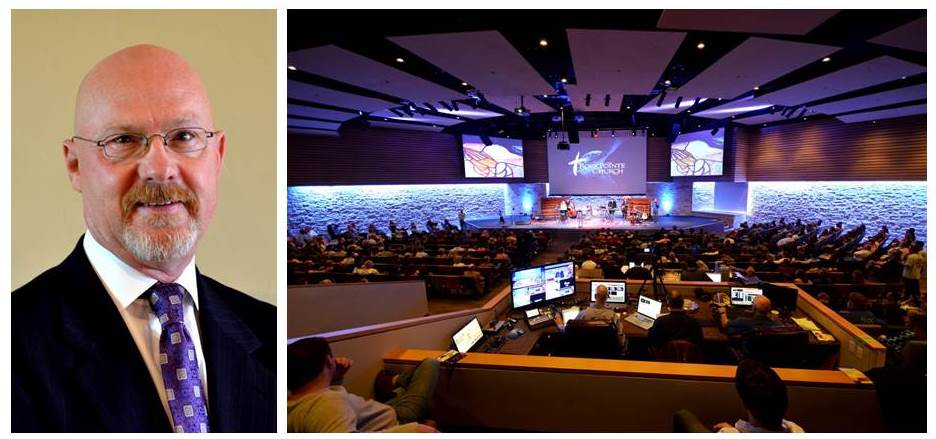The nations will walk by its light, and the kings of the earth will bring their glory into it. Rev. 21:24

.
I recently read two books by Darrow Miller: Recovering Our Mission and God’s Unshakable Kingdom. These books presented a view of life and work I had not before experienced. I came to Christ nearly 40 years ago and became very involved in Bible studies, my church, para-church organizations, and the Christian community. I greatly benefited from this experience in my family and personal life.
However, as a business owner, I had limited time between family, work and community. I found myself torn between two values: what we produced in our audio/video company and my church/personal life. I knew studying the Scriptures and sharing Christ were most important, but my business demanded more and more of me. I knew working in the world was valuable because it gave me contact with non-believers and I could give out of the money I made. Sharing Christ and giving legitimized my work.
I often wondered if I should sell my business and do something more significant, like ministry.

.
I greatly enjoyed my work, discovered I was gifted, and saw how our company benefited other people. But in my church, I learned that our product had no intrinsic value—it would all be burned up one day. Why work so hard for such temporal results? This tension left me greatly frustrated!
I began to be exposed to the writings of Tim Keller, Hugh Whelchel, Os Guinness and, eventually, Darrow Miller. These writers were from a “reformed” perspective that taught God was a worker and creator. As Recovering Our Mission explains (p. 134), God sees me as a co-creator and looks with pleasure on what He has gifted me to create in His name. Not only that—but, perhaps, the best work I have done may not be destroyed after all, but presented to HIM! I felt like my dad wanted to display the work He gifted me to do on his fridge for the entire universe to see!
If this is true, then God takes great pleasure in my work. At the end of the day or week, I can look back at my effort with my Father looking on and see if what I did was good. Did I take short cuts? Did I cheat? Did I have my customer’s best in mind or my own good? Did I serve or did I take? Did I abuse or did I care? Ideally, He and I both can look at it and say, “GOOD”!

The most freeing lesson I’ve learned regarding my work and faith came from chapter seven of God’s Unshakable Kingdom. I am not called (or even able) to totally change the culture around me; however, my faithful obedience “as leaven in culture” does impact culture a great deal. I am but a speck of yeast in a package that God Himself works into the dough of culture. And God’s math really is different: A little salt, a little light, a little leaven, a little kindness, sacrifice, concern, honesty, quality, integrity, generosity, sharing the gospel—matters. Little is big. It is discouraging hearing the news of the world and feeling helpless, but knowing that God knows me, cares for me, created me, and uses my little life for His great good provides hope and encouragement to excel in all things.
How wonderful! The gifts God gave me and their fruit have meaning and purpose. I honor and glorify God with menial tasks. When I get up each morning and serve our employees and clients, I also serve God and enjoy His pleasure. That is even better than a paycheck.
It is inspiring, motivating, and makes me want to share His love for me and the pleasure He finds in me.

I believe this next generation has grown up learning they do not matter because they were not created by a loving God who values them and their work. I believe this message is for them:
You were created to create, and God takes so much pleasure in you and what you do that He sacrificed Himself so neither you nor your best creations would be burned up.
The kings will bring their best, and God will put it on the fridge. He will say, ‘My Son died so men and all of creation would be redeemed.’ Now that’s worth getting up for in the morning.
Chris Jordan, CTS
President & Chief Steward
Note: Chris calls himself “Chief Steward” because, he says, a steward manages another person’s affairs, and he stewards his clients’ resources, his employees, and the larger community. “I also know our business is His vineyard and He has left me in charge until He returns,” Chris says. “I want Him to find me doing a good job. Calling myself Chief Steward reminds me of this.” You may contact Chris at cjordan@eavi.com.
Here’s an excellent video from our friends at the Institute for Faith, Work and Economics that captures beautifully what Chris is saying:




4 Responses
This article may be from last year, but it is inspiring.
A dairy farmer once told me that they produced milk on their farm to get an income so that they could give to missions.
I am glad about the missions part.
But I said back to them: God is also delighted in you loving your neighbor by providing good quality safe milk!
Right on, Jon!
Well done job. If possible send me some books on urban Church planting. I love mission field work, I am a student of mission courses in JETS seminary in Nigeria. Thank you for good rappor
Dear Apollos, thank you so much for your note! While we do not have any books specifically on urban church planting, please visit our web page Join In to explore the many ways you can partner with us. You may be interested in our learning resources, many of which are available for a free download.
I would most highly recommend you explore our FREE online learning curriculum called Coram Deo: A School for Discipling Nations.
Lastly, you may wish to connect directly with our Local Networks in Nigeria and nearby.
Please let me know if you have any questions.
Many blessings to you!
–Mary